Rachel Neumeier's Blog, page 55
January 1, 2024
End of Year Lists
From Molly Templeton at tor.com: Rethinking the End of Year Book List
Templeton says: Not everything I read is on one of these lists, but every book I read this year, regardless of publication date, could be included. Each book can appear only once. Each list can have a maximum of five books on it. And sometimes, a list is just one thing. …
Then she offers the following categories:
Three excellent series books.
Five books I should have read a long time ago.
Let’s all read more books about art.
One book from which I learned something I didn’t know I didn’t know.
Two books from one criminally underread author.
Some of the most excellent books I read this year that came out last year.
One absolute WTF? book.
Two beloved poetry collections
Five brilliant debut novels.
This is a great job creating quirky, fun categories! I’m impressed! I haven’t done a best-of list for 2023, or any kind of list for 2023, but maybe I should, taking this kind of list as a model — any categories I happen to think of, no need to take anything too seriously. Maybe I’ll take a stab at that tonight.
Meanwhile, what looks especially interesting in Molly Templeton’s list? To me, this one:
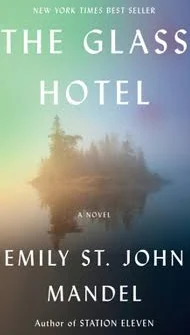
Glass Hotel is the “one book where I learned something I didn’t know I didn’t know,” and the thing in question is what a Ponzi scheme really is and how it really works:
I did not fully understand the term “Ponzi scheme,” despite reading it in the news approximately seven thousand times, until I read this book. It is a very, very, very good book, but for some reason I wanted to note this thing that I did not expect to learn from it. You just never know what you’ll take away from a great book, is all.
I remember struggling with the idea quite a long time ago, when I was a kid. I think I had a teacher (or friend? or brother?) show with a diagram scheme how a Ponzi scheme works until suddenly it crashes down. Oh, you know what, I remember this coming up in the context of chain letters. That’s the context. I don’t know if chain letters are still a thing.
Anyway, here’s the description:
Vincent is a bartender at the Hotel Caiette, a five-star lodging on the northernmost tip of Vancouver Island. On the night she meets Jonathan Alkaitis, a hooded figure scrawls a message on the lobby’s glass wall: Why don’t you swallow broken glass. High above Manhattan, a greater crime is committed: Alkaitis’s billion-dollar business is really nothing more than a game of smoke and mirrors. When his scheme collapses, it obliterates countless fortunes and devastates lives. Vincent, who had been posing as Jonathan’s wife, walks away into the night. Years later, a victim of the fraud is hired to investigate a strange occurrence: a woman has seemingly vanished from the deck of a container ship between ports of call.
In this captivating story of crisis and survival, Emily St. John Mandel takes readers through often hidden landscapes: campgrounds for the near-homeless, underground electronica clubs, service in luxury hotels, and life in a federal prison. Rife with unexpected beauty, The Glass Hotel is a captivating portrait of greed and guilt, love and delusion, ghosts and unintended consequences, and the infinite ways we search for meaning in our lives.
This sounds evocative, if not exactly inviting. I wouldn’t be interested except that I liked and admired Station Eleven. Well, plus if Molly Templeton says it’s a “very, very, very good book,” then it’s probably great in at least some ways.
Who is the criminally underread author? Not me, alas! It’s Alaya Dawn Johnson, who has been somewhat on my radar since she wrote Summer Prince.
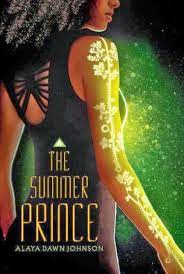
A heart-stopping story of love, death, technology, and art set amid the tropics of a futuristic Brazil.The lush city of Palmares Tres shimmers with tech and tradition, with screaming gossip casters and practiced politicians. In the midst of this vibrant metropolis, June Costa creates art that’s sure to make her legendary. But her dreams of fame become something more when she meets Enki, the bold new Summer King. The whole city falls in love with him (including June’s best friend, Gil). But June sees more to Enki than amber eyes and a lethal samba. She sees a fellow artist.…
It’s a YA dystopia, but for me, it stood out from the vast horde of YA dystopias that we saw after The Hunger Games. I’m a fan of setting, which is probably why I noticed it. It looks pretty grim, which is probably why I didn’t read it.
Have any of you read anything by this author? What did you think?
Templeton also says this book:
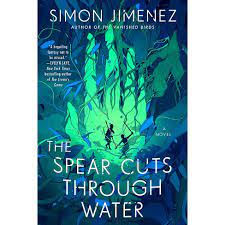
The Spear Cuts Through Water is the great overlooked book of 2022. That’s quite a statement. What’s this book about?
Two warriors shepherd an ancient god across a broken land to end the tyrannical reign of a royal family in this epic fantasy
Hmm. Tell me more.
With the aid of Jun, a guard broken by his guilt-stricken past, and Keema, an outcast fighting for his future, the god escapes from her royal captivity and flees from her own children, the triplet Terrors who would drag her back to her unholy prison. And so it is that she embarks with her young companions on a five-day pilgrimage in search of freedom—and a way to end the Moon Throne forever. The journey ahead will be more dangerous than any of them could have imagined.
Hmm. Let’s look at the top review:
I’m having a hard time describing this incredibly layered, ambitious, and unconventional book. It is familiar in its epic fantasy/folk tale story beats, but it’s told in such a unique, experimental, metaphysical style. It’s woven deeply into the novel and doesn’t feel like a gimmick. A little preview: there’s the story of the reader, who is then invited to a play in the spirit realm, and that stage play is the main heart of the book.
The author adds little asides told directly to the reader as if the characters are there watching with you, their commentary adding spice and giving a sense of the wide scope of a fully lived-in world. And still, the writing feels intimate, giving voice to side characters that could have been so easily discarded. Reading this book feels like you’re really in the audience of a theater with actors breaking the 4th wall (and maybe the person next to you keeps adding little quips since it’s actually based on their life…)
Well, it definitely sounds interesting. It sounds like the kind of thing where I will keep putting off looking at it. However, sure, let me drop a sample onto my kindle so I don’t completely forget about it. I should do a top ten list of “books I would most like to read someday, but they look too demanding and I don’t feel like I can spare the attention.”
More realistically, I ought to do another set of Ten Novel’s Opening Paragraphs. That, I can manage for sure.
Please Feel Free to Share:






The post End of Year Lists appeared first on Rachel Neumeier.
December 31, 2023
Update: New plan! Also, here’s a book to try in 2024
Welcome to 2024! I hope it’s a great year for us all personally, and it sure would be nice if it turned out to be a good year for the world.
Well, we can hope.
Update: Totally new plan for writing schedule this year!
Well, not TOTALLY new, but pretty new.
A) Silver Circle is going to be TWO BOOKS. There is no possible way it’s going to be one. This is great!
I mean, in some ways. This means, among other things, that it was fine to take four (more likely five) whole months to write it. Them. The two books it’s going to be. It also means I don’t have to worry about length anymore, yay! because that was plainly getting out of control by Christmas. I mean, it’s all very well to say “I’m going to cut 30,000 words!” because the truth is, sure, yes, I’m certain to do that, but I can also see that I’m probably going to add about that much length in order to deepen character arcs and do *waves hands vaguely* other writerly stuff like that. So it’s going to go over 200,000 words and that’s fine. The draft is currently 210,000 words and STILL not complete.
The only real problem is that now I need (a) a new title for book five, or, (b) subtitles.
I’m leaning toward the latter, because I don’t think this is going to be two self-contained books. I think it’s going to be a cliffhanger situation. Subtitles will prevent readers from being surprised about that.
B) Releasing Silver Circle this spring is not going to happen. This is not only not finished, it is also a horrifically rough first draft and I’m not even going to think about pushing to get it out before fall. I don’t need the stress, and you all deserve the best story I can write, and that means slooooow down. No one is even going to see this draft till I’ve had time not just to finish it, but also to clean it up. I’m going to aim to release these books in October / November and plan to release both of them close together, though probably not on the same day.
C) So! Before I look at even finishing Silver Circle, I’m going to take a break from it and write Marag. This one should be short, about as long as Suelen. (I think. We know what that feeling is worth, right? Not much. But I hope less than 80,000 words.) I mean, we’ll see, but I’m hoping to write a good chunk of it before classes start (Jan 17th) or at least by the end of the month. Granted, I don’t know what the heck to do about a certain plot point, but whatever, I’ll figure it out when I get there.
D) After Marag, I’ll write Rihasi. I’ve got the whole basic plot in my head, I’m pretty sure. I’m thinking it should wind up a normal length, maybe 115,000 words or thereabouts. It should be fast, barring unanticipated problems, and I am dying to write it.
I’ll schedule those for preorder just as soon as I have complete drafts. Obviously that can’t be super early in the year, but maybe March for one and May for the other. That’s what we might call a wild-ass guess.
Meanwhile:
E) After Rihasi, if I haven’t already done so, I’ll write first chapters for (i) a NFS sequel, and (ii) an Invictus sequel; and (iii) the first book of a series featuring Tano.
F) Then, while early readers are reading Marag and/or Rihasi, I will finish Silver Circle, then revise the whole huge thing into a readable draft. And that’s as far as I’m planning. Because I think I might stick to this much of a schedule, more or less. If I get this far without anything going sideways, I will then think about the back half of the year.
***
Meanwhile!
About midway through December, I saw this post at tor.com: Tor.com Reviewers’ Choice: The Best Books of 2023
And I didn’t really care because my TBR pile is more than high enough, thank you, and I am much more interested in the books you all mention here anyway. However, I noticed this specific line from Liz Bourke’s comments in that post:
Valerie Valdes’ Where Peace is Lost is my favourite novel of the year. It’s a well-executed, rip-roaringly good planetary space opera adventure with an incredibly skilled warrior protagonist—a protagonist whose commitment to the cause of least harm involves a willingness to die rather than kill, because her enemies’ lives are also valuable. A refreshing and entertaining look at the ethical conundrum of armed pacifism.
So I poked around, looking for a full review, because Liz Bourke writes great reviews, and I found this one at Locus:
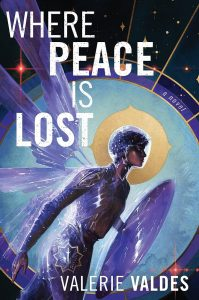
When [Kel’s] young friend Lunna brings word of a dormant Pale war machine suddenly reactivated, Kel finds her past life feeling much more present. If the giant automated machine isn’t stopped, it’ll devastate everything in its path. The two strangers – charming, flirtatious ship-captain Savvy, and laconic, private, former soldier Dare – have their own secrets and their own goals, but it turns out they’re honest about their desire to turn off the war machine, and their potential ability to do so. War machines don’t just turn on by themselves, though. A group of Pale soldiers turned this one on in order to extort a huge payout from the populace, indifferent to the death and suffering that would ensue. They could turn it back on very easily, or worse, let loose other war machines stored in a remote, disused Pale military base. And if they learn who Kel is, who Kel used to be, they might burn the whole planet to get to her. And Kel won’t let that happen. Kel will hand herself over for execution first.
That’s a brief, telling excerpt from Liz’s review, which you should certainly click through and read in its entirety, but here’s another bit:
[This story sees the protagonist] choosing to keep her ethics, even in extremis, to reclaim her identity as a protector rather than a refugee in hiding, to kill only when she can find no other option to protect others.
That makes it a deeply felt, deeply moving novel. And a very effective one. If you’re looking for something fun, fast, and unexpectedly thoughtful, give this one a try. There are few science fiction novels in the last two decades I’ve enjoyed more, or found more entertaining. It helps that Valdes isn’t lecturing on ethics, but making thematic arguments.
You know what this reminds me of? The Phoenix Feather quadrilogy. This is exactly how Sherwood Smith presents Mouse … or Ryu/Ari/Firebolt, whatever name she goes by … my point is, this sounds very similar in its treatment of what Liz is calling “armed pacifism.”
I’ve picked up a sample, downloaded the sample to my phone, and I have to say, based solely on this review, I am thinking of deliberately making Where Peace is Lost the first novel I pick up in 2024. It sounds like it would strike just the right note for a new year.
Please Feel Free to Share:






The post Update: New plan! Also, here’s a book to try in 2024 appeared first on Rachel Neumeier.
December 28, 2023
Cozy SF
Here’s a post from Book Riot: 10 Cozy Sci-Fi Books To Give You Hope for the Future
I’m suspicious. This is Book Riot, and we all know how, uh, idiosyncratic their definitions of subgenres can be.
Plus the people who write Book Riot posts don’t tend to pick Cozy anything for their lists, no matter what they say. They pick something grim and practically hopeless, something with “overcoming almost unbearable tragedy” in the description, point to a thin thread of hope that runs through the narrative, and call it Cozy.
As you all know, I think that Cozy is all about tone, plus plot. That is, it feels warm and kind right from the opening pages, and the plot may very well be slice-of-life rather than save-the-world. It’s not gritty, it’s relatively low-stress, and people are nice to each other. That’s what makes any novel Cozy.
Maybe this Book Riot post going out of its way to include “hope for the future” is a good sign. How bleak can you get and still be pointing the way toward a brighter future? –> Maybe Book Riot is going to answer that question. Let’s take a look:
Here’s their first suggestion:
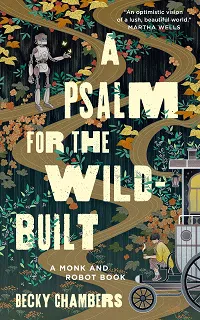
Okay, that’s reassuring! I think we all agree that A Psalm for the Wildbuilt is indeed Cozy SF. I haven’t read it, actually, but I’ve sure heard about it and it’s on my list. Reviews are always using words like “warm” and “kind” and “optimistic” for this book, which is exactly the tone that Cozy Anything has to have in order to count as Cozy.
Oh, this one is amusing:

It’s practically impossible to have “tea” in the title and not have the story be Cozy. I know I’m exaggerating, but still, The Cybernetic Tea Shop immediately sounds like a reasonable candidate for Cozy SF. What’s this story about? It’s a shortish story, by the way, not a novel.
Clara Gutierrez is an AI repair technician and a wanderer. Her childhood with her migrant worker family has left her uncomfortable with lingering for too long, so she moves from place to place across retro-futuristic America.
Sal is a fully autonomous robot. Older than the law declaring her kind illegal due to ethical concerns, she is at best out of place in society and at worst vilified. She continues to run the tea shop previously owned by her long-dead master, lost in memories of the past, struggling to fulfill her master’s dream for the shop while slowly breaking down.
They meet by chance, but as they begin to spend time together, they both start to wrestle with the concept of moving on…
“Sweet without being saccharine,” says one review. “Like curling up in a warm blanket,” says another. “Lovely, wistful, and uplifting.” I think I’ll pick it up, even though it’s also described as an “asexual romance,” and I’m feeling like maaaybe we already have a word for that kind of relationship? Have we decided as a society that friendship doesn’t exist, that we should redefine friendship as “asexual romance?” Not a fan of that whole notion, seriously.
Well, that’s a different post. Meanwhile, by all means click through and see what else in in the Book Riot post. I haven’t read any of these, but if you have what did you think?
Here’s one that isn’t in the Book Riot post:
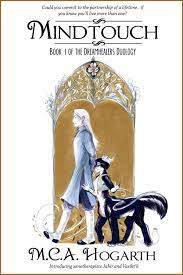
You remember this series, probably. This is Mindtouch, first of the five-book series about students — who are friends, not romantically involved — going through med school and becoming partners and doctors. It’s not that nothing sad ever happens; they’re in med school, so sometimes they have to deal with sick or dying people. Nevertheless: Cozy SF.
Here’s one I haven’t read, but I’m betting fits the bill:
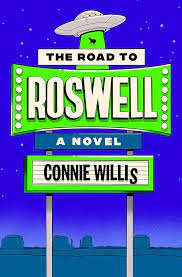
The Road to Roswell is Connie Willis’ alien abduction romp. As I say, I haven’t read it, but I did just read her collection of Christmas stories, so I’m betting this is Cozy. “Silly but adorable,” suggest reviews. Not sure that’s the same as “warm and comforting,” but I bet if you do a Venn diagram, there’s a biggish area of overlap.
If you’ve got a Cozy SF novel or story in mind, drop it in the comments!
Please Feel Free to Share:






The post Cozy SF appeared first on Rachel Neumeier.
December 27, 2023
Compressing time
A post by Patricia Wrede: Skipping Through the Story
The only difference between skipping two hours of sword-sharpening and skipping two months of traveling the Silk Road is the scale. The technique is the same. “Amelia spent the next two hours sharpening her sword” is, technically speaking, the same kind of transition as “Amelia spent the next three weeks studying advanced spellcasting” or “The caravan took another month to reach the first oasis.” … If there are multiple somewhat-important-but-still-not-worth-showing things, the author can list the high spots: “Maria spent the next three months rebuilding the burned-out shed and listening to George complain about Jenny.”
I’m smiling because of that last sentence and I bet you are too. That sentence is funny, and smooth, and it illustrates the obvious truth that it matters what you stick into a sentence when you’re compressing time. “Maria spent the next three months rebuilding the burned-out shed” would not be NEARLY as appealing. It’s all very well to say that the author can list the high spots; it’s a whole different thing for an author to do that cleverly and with a bit of humor.
Wrede continues to illustrate how to smoothly indicate passing time, including whole seasons, in just a sentence or two. Then this:
I find it really helpful to keep a calendar or time-line of when key events happen (or are supposed to happen, if I’ve not written them yet), relative to key time-markers: the last farmer’s market is in the fall, the enemy scout is captured two weeks later, Harvest Feast is mid-fall, the defector arrives with warnings and they start planning, the first new catapult is ready by Solstice, and so on.
This reminds me of revising Winter of Ice and Iron after my editor suggested putting a time marker at the beginning of every chapter. This was when I named the months (Month of Bright Rains, Apple Blossom Month, etc). There is a reminder about when we are at the top of every chapter, worked in smoothly enough that perhaps the reader doesn’t notice the reminder is there.
Counting off months in the Tasmakat required some concentration, starting with deciding what month it was when Aras and the others returned to the summer country and then estimating how long it should take for each leg of their travels thereafter and what month it should be at each stage. I do find it necessary to make notes about that. In a lot of ways, it’s just easier to write a story that takes place in one whoosh of events in less than a week, like Tano. You might pass lightly over a few hours here and there, and you might find yourself squinting as you try to figure out whether it’s been two days or three since something happened, but even so, that’s just easier. The WORST was trying to keep track of the phase of the moon in White Road of the Moon. If my copy editor hadn’t worked through the phases herself and corrected my mistakes with that, then I wouldn’t have gotten it right all the way through.
I know I’ve mentioned this before, but in the first chapter of The Sorceress and the Cygnet, Corleu grows up from a child to a young man. Less than a chapter, just a few pages. That’s always what I think of when I think of compressing time. It’s definitely a trick to encapsulate someone’s whole childhood in five pages. McKillip does it by using that section to do a bit of worldbuilding and establish the feel of the story.
Techniques used to compress time, from hours to a decade or more, are certainly something to pay attention to when learning to write.
Please Feel Free to Share:






The post Compressing time appeared first on Rachel Neumeier.
Learning to write fantasy by reading SF
A post by Matthew Claxton: I learned everything I need to know about fantasy from a sci-fi novel
He’s talking about Michael Swanwick, whose work has not usually really worked for me, though I can tell he’s a great writer. But it’s interesting what Claxton says about Swanwick’s Stations of the Tide, a book I’ve never read.
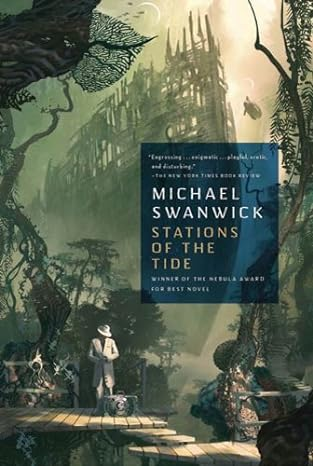
Stations of the Tide is set on the planet Miranda, in a solar system that was clearly colonized centuries, if not thousands of years, before the start of the story. Miranda undergoes “jubilee tides,” long seasons that see vast amounts of water locked up polar icecaps for hundreds of years, only to then catastrophically melt. In the Tidewater, the low, flat swampy zone that flips back and forth between land and ocean, the native biota can take two forms – one terrestrial, one aquatic.
Wow, maybe I should read this after all! What a great idea for ecosystems!
… the bureaucrat is plunged into a world in which almost everyone believes in magic. There are witches and occultism, TV ads for miracles for a price, tantric sex, hallucinatory drugs, false identities, and a strange encounter with what may be the last of a lost species of shapeshifters exterminated by the early human colonists. …
Yet this is not a science-fantasy. Every bit of magic is explicable – biotech, nanotech, stage magic and illusion. There are robots and AIs, and when the bureaucrat needs more data, he goes into a truly advanced brain-computer interface to check in which is superiors in the advanced orbital civilization high above the planet’s surface. His only reliable ally on the surface is his briefcase, which chats with him frequently and is quite capable of escaping from theft attempts on its own.
It is definitively not a fantasy novel. But it is more fantastic than 90 percent of what is published as fantasy.
There’s a constant tension in the modern fantasy genre over exactly how much magic should be demystified.
On the one hand, there are books that don’t explain magic much, if at all1. It’s miracles and ghosts and ancient curses and distant unknowable gods, and hostile wizards. On the other end of the spectrum, you have magic at its most explained, the “magic system” books where the author shows you the charts and graphs. This is Dungeons & Dragons magic. Advance a level, now your fireball does 5d6 damage instead of 4d6!
The difference between these types of magic is the way they can make you feel while reading. On the one hand, you have the potential of experiencing the numinous, on the other, you understand the rules of the game.
Stations of the Tide may not contain any actual magic (probably) but it is numinous as hell! It manages this despite the fact that the bureaucrat sees through, or has explained to him, the tricks used against him by magicians in the service of Gregorian. …
This sounds really, really interesting.
This is what drives how I think of fantasy. It’s not whether or not the magic is real. It’s how it works in the story. Is there magic on Miranda? You could argue that magic is a very real force in the story, precisely because it is widely believed to be real. … The important thing is that the book’s sympathy is with the magic. The bureaucrat may lift the veil on cheap magic tricks, but at the end, he’s the one in the role of the mystic.
The description on Amazon refers to this as “surreal hard SF.” That’s an interesting description.
Here’s the opening of the novel:
The bureaucrat fell from the sky.
For an instant Miranda lay blue and white beneath him, the icecaps fat and ready to melt, and then he was down. He took a highspeed across the stone plains of the Piedmont to the Heliostat terminus at Port Richmond, and caught the first flight out. The airship Leviathan lofted him across the fall line and over the forests and coral hills of the Tidewater. Specialized ecologies were at work there, preparing for the transforming magic of the jubilee tides. In ramshackle villages and hidden plantations people made their varied preparations for the evacuation.
I love this, and also, I want to just point out that Swanwick has worked the word “magic” into the first real paragraph. Somehow I bet that’s not random chance, given the linked post indicates that this story is presenting SF as magic in a very different way than anything I’ve heard of previously.
Okay, I’m picking up a sample.
Have any of you read this? What did you think?
Please Feel Free to Share:






The post Learning to write fantasy by reading SF appeared first on Rachel Neumeier.
December 25, 2023
Rewriting
Great post by PJ Parrish at Kill Zone Blog: Rewriting: Keep Your Eyes Open And Your Ego Closed
We’ve now re-published ten of our old books. Yes, we did some rewriting on all of them. The first one, Dark of the Moon, we have yet to re-publish because we believe it has fundamental problems that need more than a normal rewrite can solve. Here’s some of the things we learned in this process with our freshman effort book:
We got preachy.
We fell prey to stereotypes.
We lost track of “book” time.
We didn’t know what we wanted to say.
Comments about all these points in the original post, obviously.
I think this is a great post because I agree: after ten years or so, you are likely to see your earliest book through new eyes, and giant things are likely to leap out at you, and you are likely to wonder how the heck you missed all that super obvious stuff the first time.
Here’s what PJ Parrish says about that last point, about not knowing what you wanted to say:
I’m going out on limb here and say all good books have themes. I don’t think we understood this until about book 4. Yes, you want to entertain readers. But beneath the grinding gears of plot, even light books can have something to say about the human condition. A romance might be “about” how love is doomed without trust. A courtroom drama might be “about” the morality of the death penalty.
We missed the theme in Dark of the Moon. Only now, as we rewrite it, are we understanding that the theme is every person’s search for home. For Louis, it was literally going back to the southern town where he was born and then understanding that it wasn’t “home” at all. The entire series now has a theme — Louis, a man who has walked uneasily in two racial worlds — trying to find his spiritual home.
This is important. It’s not all that easy to see the themes in your own novels (or that’s my experience).
Parrish adds:
Try this experiment: Write the back copy for your work in progress — three paragraphs at most. Ha! Can’t do it? Well, you might not have a grip on what your story is about at its heart. Now often your theme doesn’t show itself until you’re well into your plot. Well, that’s okay. But when it begins to whisper, listen hard. Good fiction, Stephen King says, “always begins with story and progresses to theme.”
For once I totally agree with King. Also, this is a good suggestion.
Also! Maybe try writing a review of your own book, the way I wrote one about The Crane Husband not that long ago. I didn’t see what I thought was the heart of the story until I wrote that review. That happens kind of a lot. It worked the same what when I wrote a review of Sarah Beth Durst’s Journey Across the Hidden Isles. In one case, I liked the story even less after I figured out what it was really about, what view of the world it offered. In the other, I liked the story even better after the same process.
So, write a review of your book where you try to pull out the same things — what is it really about, what view of the world is set at the heart of your story? There you go. Now you see the themes you put into your story.
To end, here is the post where I talk about rewriting my very first fantasy trilogy, thus turning that trilogy into two standalones, The White Road of the Moon and Winter of Ice and Iron. I didn’t really think about theme when I did that, however. That was all plot focused. It sure involved the same kind of realizations about story weaknesses. I specifically remember thinking Wow, a hundred pages where nothing really happens, huh. Sometimes you just don’t have the tools to see where your novel succeeds and fails until years after you wrote it.
Please Feel Free to Share:






The post Rewriting appeared first on Rachel Neumeier.
Merry Christmas!
May you all have a beautiful day, whether or not you celebrate Christmas.
If you enjoy Christmas themed stories around this time of year, as I do, here you go. I’ve read most, but not all, of the books linked below.
Christmas fantasy: The Lion the Witch and the Wardrobe
Another Christmas fantasy: Hogfather by Terry Pratchett
Another Christmas fantasy novel: Winter’s Tale by Mark Helprin
Christmas SF: Christmas on Outcast Station by Jeanne Adams and Nancy Northcott
Another Christmas SF: Winterfair Gifts by Lois McMaster Bujold — short story
Christmas mystery: Hercule Poirots Christmas by Agatha Christie
Another Christmas mystery: A Christmas Gathering by Anne Perry
Another Christmas mystery: The Christmas Murder Game by Alexandra Benedict
Christmas epistolary historical: The Last Christmas in Paris by Hazel Gaynor and Heather Webb
Christmas romance: A Kiss for Midwinter by Courtney Milan
Christmas romance: A Vicarage Christmas by Kate Hewitt
Christmas novel: In This House of Brede by Rumer Goden — doesn’t actually center on Christmas, but I often find myself re-reading it in December.
Christmas short story: The Land of the Blue Flower by Frances Hodgson Burnett — not explicitly a Christmas story, but it’s a Christmas story.
Christmas Suspense/Thriller: The Girl Who Died by Ragnar Jonasson
Christmas collection: A Lot Like Christmas by Connie Willis, and by the way, Willis includes lists of Christmas movies, shows, and books at the end of this collection.
Christmas episode of Buffy: Amends
“In this Bleak Midwinter,” performed by Annie Lennox
“O Holy Night,” performed by Lindsay Stirling
Please Feel Free to Share:






The post Merry Christmas! appeared first on Rachel Neumeier.
December 21, 2023
A Stranger in Olondria, chapter three
Would you like to follow along in Olondria? I’m farther than this, but this is an interesting way to begin this chapter, so take a look:
***
“A book,” says Vandos of Ur-Amakir, “is a fortress, a place of weeping, the key to a desert, a river that has no bridge, a garden of spears.” Fanlewas the Wise, the great theologian of Avalei, writes that Kuidva, the God of Words, is “a taskmaster with a lead whip.” Tala of Yenith is said to have kept her books in an iron chest that could not be opened in her presence, or she would lie on the floor, shrieking. She wrote, “Within the pages there are fires, which can rise up, singe the hair, and make the eyelids sting.” Ravhathos called the life of the poet “the fair and fatal road, of which even the dust and stones are dear to my heart,” and cautioned that those who spend long hours engaged in reading or writing should not be spoken to for seven hours afterward. “For they have gone into the Pit, into which they descend on Slopes of Fire, but when they rise, they climb on a Ladder of Stone.” Hothra of Ur-Brome said that his books were “dearer than father or mother,” a sentiment echoed by thousands of other Olondrians through the ages, such as Elathuid the Voyager, who explored the Nissian coast and wrote: “I sat down in the wilderness with my books, and wept for joy.” And the mystic Leiya Tevorova, that brave and unfathomable soul, years before she met her tragic death by water, wrote: “When they put me into the Cold, above the white Lake, in the Loathsome Tower, and when Winter came with its cruel, hard, fierce, dark, sharp and horrible Spirit, my only solace was in my Books, wherein I walked like a Child, or shone in the Dark like a Moth which has its back to a sparkling Fire.”
In my room, in my village, I shone like a moth with its back to a sparkling fire. Master Lunre had taught me his sorcery; I embraced it and swooned in its arms. The drudgery of the schoolroom, the endless copying of letters, the conjugation of verbs – ayein, kayein, bayreinan, bayreinun – all of this led me at last through a curtain of flame into a new world which was a new way of thinking and speaking, a new way of moving, a means of escape. Master Lunre’s massive sea-chest did not hold the bones of a murdered wife, but a series of living lovers with whom he lay down voluptuously, caressing the hair of each one in turn: his books, some written by hand and some from the printing press, that unearthly inventions of the wizards of Asarma. I soon understood why, when I went in to call him for the evening meal, my master could always be found stretched out on his pallet in the same position: his head on his hand, his bare chest gleaming, a thin sheet drawn over his hips, his earrings glinting, his spirit absorbed in the mists of an open book. I, too, soon after I read my first book, Nardien’s Tales for the Tender, succumbed to the magical voices that called to me from their houses of vellum. It was a great wonder to me to come so close to those foreign spirits, to see with the eyes and hear with the ears of those I had never known, to communicate with the dead, to feel that I knew them intimately, and that they knew me more completely than any person I knew in the flesh. I confess that I fell quite hopelessly in love with Tala of Yenith, who was already an old woman when the printing press was invented. When she heard of it, she is said to have danced in ecstasy, crying out, “They have created it! They have created it!” until she fell down in a dead faint. Her biographer writes: “When she rose, she began her rapturous dance again, shouting, “They have created it!” until her strength was wholly exhausted. She continued like this, beyond the control of the people of her House, who feared to subdue her with force, for seven days, whereupon she died …”
The books of my master’s sea chest were histories, lyrics, and romances, as well as a few religious texts and minor philosophical works. In their pages, I entered, for the first time, the tree-lined streets of Bain, and walked in the Garden of Plums beside the city’s green canal. I fought with the rebel Keliadhu against Thul the Heretic, and watched the sky fill with dragons, unfurling fires like cloth of gold. I hunted mushrooms in the Fanlevain and fleet wild deer on the plains, and sailed down the swift Ilbalin through the most radiant orchards on Earth; I stood in a court in Velvalinhu, the dwelling place of the kings, and watched a new Telkan kneel to receive the high crown of black and white silk. My dreams were filled with battles, haunted woods and heroic voyages, and the Drevedi, the Olondrian vampires whose wings are like indigo. Each evening I lay on my pallet, reading by the light of an oil lamp, a tear-shaped bowl made of rust-colored clay – a gift from Master Lunre.
***
Well, what do you think?
I think this passage is a love letter to books – particularly adventure tales – particularly fantasy adventure tales. Put A Stranger in Olandria together with Jo Walton’s Among Others and you’d have, in the first, a love letter to extant SFF; and in this one, a love letter addressed to all the fantasy stories that haven’t yet been written. It’s all so unfamiliar, all those names! And at the same time, perfectly familiar. No wonder SFF readers embraced this book; how could anybody do otherwise in the face of the above paean?
I’m also thinking of the occasional criticism of fantasy that goes like this: All those made-up names! Ugh! Reading these three paragraphs brings that kind of criticism to mind rather forcefully. Unfamiliar names and unfamiliar history are not particularly a characteristic of fantasy, of course. I mean, that’s obvious. You could write a passage very much like the one above, substituting … say … names and history from the Indian Ramayana, and the names would be just as unfamiliar to most modern American readers, while you could just as easily point to a hundred contemporary fantasies where the protagonist is named (for example) Kate, and the action takes place mostly in (say) Atlanta. The thing about unfamiliar names is therefore not a criticism of fantasy; it’s a criticism of unfamiliar settings, that’s all. Even so, it’s true that readers who enjoy specifically secondary world fantasy are probably going to enjoy unfamiliar names and references to unfamiliar history. I love all this. If I’d written the paragraphs above, I wouldn’t have a clue about the places and history to which I referred, but if I brought dragons into the story later, they’d unfurl fire like cloth of gold across the sky. I’m not sure about the vampires with wings “like indigo.” I didn’t leave out a word. Indigo what? I’m not sure. I’m getting an image of immense impressionist wings like smears of color rather than wings that are exactly physical.
At the end of chapter three, Jevick’s father suddenly dies and there’s another tremendously elaborate descriptive scene detailing the mourning customs. Then we move into the main part of the story, as Jevick is now free to journey to Olondria. Chapter four is subtitled At Sea. I’m definitely much happier now that we’ve come to this part of the story, but holding myself back from fully engaging with the story because the first chapter means I expect more cruelty and possibly helplessness in the face of cruelty. But, yep, Samatar’s prose sure is lovely.
Please Feel Free to Share:






The post A Stranger in Olondria, chapter three appeared first on Rachel Neumeier.
The story of Prometheus is not a cautionary tale
A post by Virginia Postrel: The Myth of Prometheus Is Not a Cautionary Tale
Virginia Postrel is a very good writer who mostly writes nonfiction about the influence of textiles on civilization and glamour and things like that. That’s why her name caught my eye when I happened to see a link to this post about Prometheus. Especially since, I mean, the story of Prometheus is definitely not a cautionary tale. I wouldn’t have thought it was necessary to say so.
But here:
Listening to Marc Andreessen discuss his Techno-Optimist Manifesto on the Foundation for American Innovation’s Dynamist podcast, I was struck by his repetition of something that is in the manifesto and is completely wrong. “The myth of Prometheus – in various updated forms like Frankenstein, Oppenheimer, and Terminator – haunts our nightmares,” he writes.1 On the podcast, he elaborated by saying that, although fire has many benefits, the Prometheus myth focuses on its use as a weapon.
No. No. No. No.
Prometheus is punished for loving humankind. He stole fire to thwart Zeus’ plans to eliminate humanity and create a new subordinate species. He is a benefactor who sacrifices himself for our good. His punishment is an indicator not of the dangers of fire but of the tyranny of Zeus.
Prometheus is cunning and wise. His name means foresight. He knows what he is doing and what the likely consequences will be.
I … kind of thought everyone knew that. But I guess not.
Quick segue: the Prometheus I best remember from any SFF book is this one —
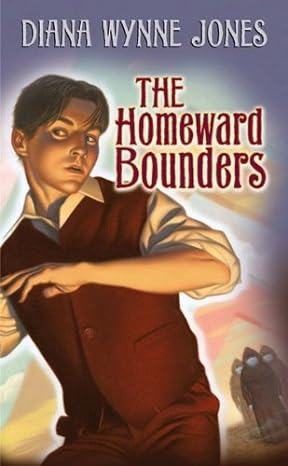
We’ve all read this, yes? I’m not sure where I would put this book among the many DWJ’s works I love, but pretty high up. This is also a story in which DWJ’s showed off her skill at bringing highly disparate threads together into a single satisfying narrative. This is a skill at which she excelled. One of those threads was the Prometheus myth, and I’m glad to say that Prometheus was freed in this story. As was only right, as he was a benefactor of humanity and definitely not the star of a cautionary tale.
Please Feel Free to Share:






The post The story of Prometheus is not a cautionary tale appeared first on Rachel Neumeier.
December 19, 2023
Scene Craft
Here’s a post at BVC by Maya Kaathryn Bohnhoff: New Writers Ask: What is Scene Craft and How Do I Get Some?
I write each scene with the awareness that every scene builds upon the ones that come before and contribute to the reader’s understanding of the scenes that come after. This may seem obvious, but I have encountered many writers who view scenes as a series of isolated or encapsulated events (or info dumps). This can lead to the writer trying to shove too much information into each scene.
I wonder if this is a problem for writers who are more experienced with short stories or whose natural length is the short story. I have met novelists who say they prefer short forms and when they write novels, they write them as though they were writing a series of short stories. This seems both reasonable and strange at the same time. I’ve read book-length collections of episodes that were basically a set of linked short stories, and that can work. But in that case, the author had better remember the stories are linked and not try to recap all the background info or whatever in each episode.
Scenes are the building blocks of a story; they are meant to build toward a complete structure. When you plant a suspicion in a scene in chapter two, trust that it will be an element in a scene in chapter twelve whether you intended it to or not, because the reader will read the rest of your story looking for the place that element fits and that suspicion pays off. [Emphasis in original.]
Well, yes, in a murder mystery. If it’s a worldbuilding element or foreshadowing, I won’t actually be looking for it as I continue reading; I’ll just recognize it when it turns up.
My question going in is: What do I want this scene to tell the reader about the characters—not just the ones who are in the scene, but possibly characters who are off-page as well? … The state of your characters at the end of a scene should be different in some way from their state at the beginning. In other words, there should be some advancement of the character along their arc—i.e. knowledge or insight gained, conflict sparked and/or conflict resolved, questions answered and/or questions posed.
Yes, I think that’s right: what do you want the readers to see about the characters, how do you want the characters to move through their arcs. But also: what needs to happen to move the plot forward. Those two things, basically.
Pretty good post overall. Heavy emphasis on character. That suits me, but also, probably better not to forget that the plot as well as the characters should probably be moving.
Please Feel Free to Share:






The post Scene Craft appeared first on Rachel Neumeier.



